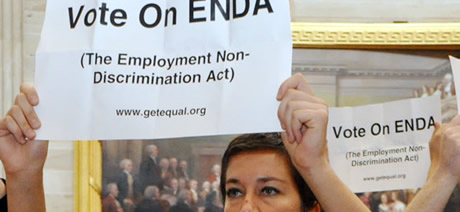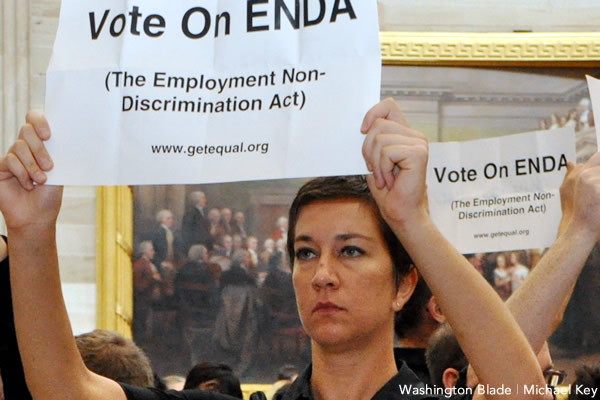News
HISTORIC: Senate votes to advance trans-inclusive ENDA
By vote of 61-30, senators start debate on pro-LGBT job bias bill


The U.S. Senate invoked cloture on the Employment Non-Discrimination Act. (Washington Blade file photo by Michael Key)
In another milestone moment in the pursuit of equal rights for LGBT Americans, the U.S. Senate voted by a narrow margin on Monday to bring to the floor the Employment Non-Discrimination Act.
By a vote of 61-30, senators invoked cloture on the legislation as Sen. Mazie Hirono (D-Hawaii) presided. The vote enables up to 30 hours of debate and amendments before a vote for final passage, which is expected Wednesday.
The 54 Democrats who voted for ENDA, whose chief sponsor is Sen. Jeff Merkley (D-Ore.), consisted of the Democrats who co-sponsored ENDA as well as Sens. Cory Booker (D-N.J.), Joe Manchin (D-W.Va.) and Mark Pryor (D-Ark.). Sen. Claire McCaskill (D-Mo.), an ENDA co-sponsor, didn’t vote.
On the Republican side, additional votes came from Sens. Kelly Ayotte (R-N.H.), Rob Portman (R-Ohio) and Pat Toomey (R-Pa.). Other votes came from Sens. Orrin Hatch (R-Utah), who voted for the bill in committee, and Sen. Dean Heller (R-Nev.), who articulated his support earlier in the day. Sen. Lisa Murkowski (R-Alaska), who also voted for ENDA in committee, didn’t vote.

Sen. Tammy Baldwin (D-Wis.) addressed reporters following the vote. (Washington Blade photo by Michael Key)
Including the Republican original co-sponsors of ENDA — Sens. Susan Collins (R-Maine) and Mark Kirk (R-Ill.) — the bill had seven Republican votes. As he indicated he would, Sen. Jeff Flake (R-Ariz.) voted “no” after entering the Senate chamber following Sen. Tammy Baldwin (D-Wis.), apparently after a conversation with her.
As the vote took place, there were concerns there would be insufficient votes to invoke cloture on ENDA because of Murkowski’s absence, but Portman and Toomey, after intense conversations with colleagues, entered the Senate chamber just before the vote was called to vote “yes.”
The roll call of the vote for cloture on ENDA can be found here.
Prior to the vote, lawmakers who support the legislation spoke out in favor of the bill, touting it as a means of advancing equal opportunity and the “American Dream.”
Senate Majority Leader Harry Reid (D-Nev.) said ENDA is necessary because discriminating against gay workers is legal in 29 states and for being transgender in 33 states.
“The patchwork of state laws excludes tens of millions of Americans from basic protection against discrimination,” Reid said. “It is simply not good enough. It is [time to] pass a federal law that ensures all Americans regardless of where they live can go to work unafraid to be who they are. As long as hardworking, qualified Americans can be denied job opportunities, fired, or harassed because of their sexual orientation or gender identity, all workers are at risk.”
Sen. Tom Harkin (D-Iowa), chair of the Senate Health, Education, Labor & Pensions Committee from which the legislation originated, said passage of ENDA would say LGBT Americans “deserve the same civil rights protections as all other Americans.”
“We are here because, even though most Americans believe firing or refusing to hire someone based their sexual orientation is illegal, they are incorrect,” Harkin said. “The majority of Americans, more than 56 percent, live in states where it is perfectly legal to fire someone or to refuse to hire them because of who they are, a lesbian, gay, bisexual or transgender citizen.”
Amid concerns that the religious exemption is too broad and calls from some LGBT advocates for lawmakers to speak out against it, Harkin said the language is necessary to ensure bipartisan support.
“This is a compromise that has been hard for strong advocates of civil rights and civil liberties, including me, to accept,” Harkin said. “But it is an exemption that has helped to persuade some members of strong faith that ENDA should become law. I would point to my friend Sen. Hatch, who supported this bill in committee, as just one important example of senators who are satisfied that this exemption serves to reconcile the strictures of their faith with fundamental fairness in the workplace.”
Sen. Tammy Baldwin (D-Wis.), the only openly gay member of the Senate, said she understands some lawmakers may have political difficulties in supporting the legislation, but encouraged her colleagues to stand on the right side of history.
“I realize that for some, this is not an easy vote,” Baldwin said. “I understand that for some they may believe that it’s not good politics. But I want to say that I have a deep respect for those who choose to stand on the side of progress for our country this week. So for those that stand up this week and answer the call for courage, I can say with confidence your courage will be respected and remembered when this struggle is written.”
Sen. Mark Kirk (R-Ill.), a Republican and original co-sponsor of ENDA, spoke on the Senate floor for the first time in two years after suffering a stroke.
“I have been silent for the last two years due to a stroke a little under two years ago,” Kirk said. “I have risen to speak because I’m so passionate in enacting the ENDA statute.”
It’s the first time a version of ENDA with transgender protections has come to the floor of either chamber of Congress. In 2007, controversy ensued after gay former Rep. Barney Frank dropped the transgender provision from the bill over the concern an inclusive bill couldn’t be passed.
Mara Keisling, executive director of the National Center for Transgender Equality, said the cloture vote on ENDA is “an important step” toward ensuring workplace fairness for everyone, including transgender workers.
“Tonight’s procedural vote is an important step toward making sure our country gives every worker, including transgender workers, the same chance at having security at work and caring for the ones they love,” Keisling said. “The Employment Non-Discrimination Act does just that.”
It’s also the first time the Senate has considered ENDA since 1996, when the bill came to the floor as part of a deal to consider the Defense of Marriage Act and failed by one vote.
The cloture vote is also significant because the 60-vote threshold necessary to overcome a filibuster is higher than the simple majority needed for final passage. It means the legislation is almost certain win final approval in the Senate.
Amendments are expected in the coming days. After his “yes” vote on cloture, Portman announced he’ll introduce an amendment that would prevent retaliation against religious organizations and make changes to the introductory section that highlight and explain the importance of religious liberty.
White House Press Secretary Jay Carney praised lawmakers for voting for cloture on the legislation, saying President Obama welcomes the bipartisan support for the bill.
“He thanks the lawmakers from both sides of the aisle who have stood up for America’s core values of fairness and equality, and looks forward to the Senate’s consideration of ENDA,” Carney said. “He also encourages lawmakers to ensure that the legislation remains true to its goals as it is considered.”
LGBT advocates praised the vote on ENDA as a milestone moment in anticipation of additional debate that will take place in the days to come.
Chad Griffin, president of the Human Rights Campaign, said the cloture vote indicates the time has come for ENDA’s passage.
“Today we saw American democracy in action with the U.S. Senate finally following the will of a diverse and bipartisan collection of Americans calling for workplace fairness,” Griffin said. “With a super majority of Senators, more than 100 major American companies, and more than two-thirds of Americans all standing proudly in support of ENDA, there is tremendous momentum behind this common-sense bill. ENDA’s time has come, and we’re not going to stop fighting until it is passed once and for all.”
Tico Almeida, president of Freedom to Work, drew attention to the bipartisan support the legislation won on the Senate floor.
“The U.S. Senate has taken a historic step toward ensuring that gay and transgender Americans have the same workplace protections that give all Americans a fair shot to succeed on the job,” Almeida said. “Today’s strong bi-partisan vote total for the Employment Non-Discrimination Act reflects that majorities of Americans from both parties believe nobody should get fired or harassed just because of who they are or whom they love.”

The Mexican Senate on Thursday approved a bill that would ban so-called conversion therapy in the country.
Yaaj México, a Mexican LGBTQ rights group, on X noted the measure passed by a 77-4 vote margin with 15 abstentions. The Chamber of Deputies, the lower house of Mexico’s congress, approved the bill last month that, among other things, would subject conversion therapy practitioners to between two and six years in prison and fines.
The Senate on its X account described conversion therapy as “practices that have incentivized the violation of human rights of the LGBTTTIQ+ community.”
“The Senate moved (to) sanction therapies that impede or annul a person’s orientation or gender identity,” it said. “There are aggravating factors when the practices are done to minors, older adults and people with disabilities.”
Mexico City and the states of Oaxaca, Quintana Roo, Jalisco and Sonora are among the Mexican jurisdictions that have banned the discredited practice.
The Senate in 2022 passed a conversion therapy ban bill, but the House of Deputies did not approve it. It is not immediately clear whether President Andrés Manuel López Obrador supports the ban.
Canada, Brazil, Belgium, Germany, France, and New Zealand are among the countries that ban conversion therapy. Virginia, California, and D.C. are among the U.S. jurisdictions that prohibit the practice for minors.
The White House
Four states to ignore new Title IX rules protecting transgender students
Biden administration last Friday released final regulations

BY ERIN REED | Last Friday, the Biden administration released its final Title IX rules, which include protections for LGBTQ students by clarifying that Title IX forbids discrimination based on sexual orientation and gender identity.
The rule change could have a significant impact as it would supersede bathroom bans and other discriminatory policies that have become increasingly common in Republican states within the U.S.
As of Thursday morning, however, officials in at least four states — Oklahoma, Louisiana, Florida, and South Carolina — have directed schools to ignore the regulations, potentially setting up a federal showdown that may ultimately end up in a protracted court battle in the lead-up to the 2024 elections.
Louisiana State Superintendent of Education Cade Brumley was the first to respond, decrying the fact that the new Title IX regulations could block teachers and other students from exercising what has been dubbed by some a “right to bully” transgender students by using their old names and pronouns intentionally.
Asserting that Title IX law does not protect trans and queer students, Brumley states that schools “should not alter policies or procedures at this time.” Critically, several courts have ruled that trans and queer students are protected by Title IX, including the 4th U.S. Circuit Court of Appeals in a recent case in West Virginia.
In South Carolina, Schools Supt. Ellen Weaver wrote in a letter that providing protections for trans and LGBTQ students under Title IX “would rescind 50 years of progress and equality of opportunity by putting girls and women at a disadvantage in the educational arena,” apparently leaving trans kids out of her definition of those who deserve progress and equality of opportunity.
She then directed schools to ignore the new directive while waiting for court challenges. While South Carolina does not have a bathroom ban or statewide “Don’t Say Gay or Trans” law, such bills continue to be proposed in the state.
Responding to the South Carolina letter, Chase Glenn of Alliance For Full Acceptance stated, “While Supt. Weaver may not personally support the rights of LGBTQ+ students, she has the responsibility as the top school leader in our state to ensure that all students have equal rights and protections, and a safe place to learn and be themselves. The flagrant disregard shown for the Title IX rule tells me that our superintendent unfortunately does not have the best interests of all students in mind.”
Florida Education Commissioner Manny Diaz also joined in instructing schools not to implement Title IX regulations. In a letter issued to area schools, Diaz stated that the new Title IX regulations were tantamount to “gaslighting the country into believing that biological sex no longer has any meaning.”
Governor Ron DeSantis approved of the letter and stated that Florida “will not comply.” Florida has notably been the site of some of the most viciously anti-queer and anti-trans legislation in recent history, including a “Don’t Say Gay or Trans” law that was used to force a trans female teacher to go by “Mr.”
State Education Supt. Ryan Walters of Oklahoma was the latest to echo similar sentiments. Walters has recently appointed the right-wing media figure Chaya Raichik of Libs of TikTok to an advisory role “to improve school safety,” and notably, Raichik has posed proudly with papers accusing her of instigating bomb threats with her incendiary posts about LGBTQ people in classrooms.
The Title IX policies have been universally applauded by large LGBTQ rights organizations in the U.S. Lambda Legal, a key figure in fighting anti-LGBTQ legislation nationwide, said that the regulations “clearly cover LGBTQ+ students, as well as survivors and pregnant and parenting students across race and gender identity.” The Human Rights Campaign also praised the rule, stating, “rule will be life-changing for so many LGBTQ+ youth and help ensure LGBTQ+ students can receive the same educational experience as their peers: Going to dances, safely using the restroom, and writing stories that tell the truth about their own lives.”
The rule is slated to go into effect Aug. 1, pending any legal challenges.
****************************************************************************

Erin Reed is a transgender woman (she/her pronouns) and researcher who tracks anti-LGBTQ+ legislation around the world and helps people become better advocates for their queer family, friends, colleagues, and community. Reed also is a social media consultant and public speaker.
******************************************************************************************
The preceding article was first published at Erin In The Morning and is republished with permission.
South America
Argentina government dismisses transgender public sector employees
Country’s Trans Labor Quota Law enacted in 2021

Protests have broken out across Argentina in recent weeks after the dismissal of transgender people from their government jobs.
President Javier Milei’s action is in stark contract with the progress seen in 2023, where the government’s hiring of trans people increased by 900 percent within the framework of the Trans Labor Quota Law that had been in place since 2021.
Among those affected is Sofia Diaz, a “survivor” who shared her testimony with the Washington Blade hours after she traveled from Chaco Province to Buenos Aires to protest her dismissal.
Presentes, an LGBTQ news agency, reported the government dismissed more than 85 trans employees in less than two weeks.
Diaz, 49, holds a degree in combined arts. She joined the National Social Security Administration (ANSES) in 2022 under the Trans Labor Inclusion Law. The layoffs began in January and left many people feeling uncertain and anguished. It was her turn a few days ago.
Diaz in an interview recounted how the situation became progressively more complicated, with difficulties in accessing information about her employment status and the eventual confirmation of dismissals through WhatsApp messages. This government action, according to Diaz, violates the law.
“We were on a Friday, I think on March 24, in the office and we have a WhatsApp group of other colleagues from all over Argentina who entered through the trans labor quota and they tell us if we can get our pay stubs on the intranet,” Diaz recalled. “So, I tried to enter, I could not, I talked to two other colleagues and they told me no, they could not, and so we went to another person. He couldn’t either.”
“Some people told us that it could be a system error. Well, we were never calm, let’s say not how this issue of installing fear and the perversion with which they do it ends,” she added. “This sadism of … inflicting pain and speculating with your misfortune and so on … is something that characterizes Javier Milei’s government.”
Diaz recalled a list of those dismissed from the agency began to circulate from the union in the afternoon. A colleague passed it on to her, “and well, unfortunately I was also on that list.”
“At that moment the whole weekend went by with anguish, crying, and talking with other colleagues from other places, not only trans, but everyone, everyone and everyone,” she said. “On Monday when we went to try to enter, we could not enter with the biometric, which is the thumb we had to use every morning to enter.”
Despite the difficult moment through which she is going, the trans activist stressed to the Blade that she will continue protesting and will even sue the government because her dismissal is illegal and “violates the constitution itself.”
The LGBTQ community and its allies have mobilized and organized demonstrations, highlighting the importance of defending the rights won and fighting against discrimination and exclusion. Diaz emphasized the fight is not only for the people affected today, but also for future generations, saying the historical memory of the struggles for inclusion and social justice must be kept alive.
“The Argentine government thus faces a key challenge in human and labor rights, where public pressure and social mobilization can play a determining role in protecting the rights of LGBTQ+ people,” Diaz said.
-

 State Department3 days ago
State Department3 days agoState Department releases annual human rights report
-

 South America1 day ago
South America1 day agoArgentina government dismisses transgender public sector employees
-

 Maryland5 days ago
Maryland5 days agoJoe Vogel campaign holds ‘Big Gay Canvass Kickoff’
-

 District of Columbia1 day ago
District of Columbia1 day agoCatching up with the asexuals and aromantics of D.C.












